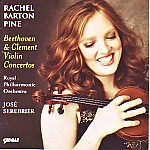Franz Clement’s name has come down to us as the dedicatee of Beethoven’s Violin Concerto, but a year previously, in 1805, he wrote his own Concerto in D, and it’s a major find. This is no orchestrally challenged, formally dysfunctional, tasteless virtuoso vehicle, but rather is a full-blown classical concerto nearly as long (40-plus minutes) as the Beethoven. The melodic material is consistently attractive–and just as importantly, equally interesting harmonically. Deftly scored, and of course wonderfully written for the violin, its lyricism clearly anticipates Beethoven’s own work of 1806. If it has one defect, it’s that the phrasing turns a little bit square now and then in the outer movements. But let’s face it–by the standards of your average early-Romantic concerto (think Spohr and his crowd) this is a masterpiece.
It goes without saying that Rachel Barton Pine plays the work with the style and elegance that it deserves. While attentive to the opportunities for fireworks (and she plays her own excellent cadenzas both here and in the Beethoven), what stays most in the mind is her beautiful singing tone. It’s the sort of sound that Beethoven must have had in mind when he wrote–as he so often did–“cantabile”, and it makes both slow movements particularly memorable. Both here and in the Beethoven, however, I can imagine a bit more muscle in the first movements, a touch more oomph from trumpets and drums, and more fire in the Beethoven finale (the Clement strikes me as just about perfect). José Serebrier is one with Pine in adopting her highly lyrical, somewhat dreamy approach, though it’s to both artists’ credit that the music never bogs down or turns self-indulgent.
As we heard in Pine’s previous, superb coupling of Brahms and Joachim concertos, the sonics are ideally warm and natural, and Cedille offers this set at two discs for the price of one (85 minutes of music in all). I would dearly love to give this release a highest rating simply for the discovery of the Clement, which every violin lover should hear both for its historical and real musical interest; but competition in the Beethoven concerto is just too stiff. Then again, no other label or violinist offers such an attractive and innovative coupling. So buy for the Clement, and consider the Beethoven a very serious bonus. [9/9/2008]
































